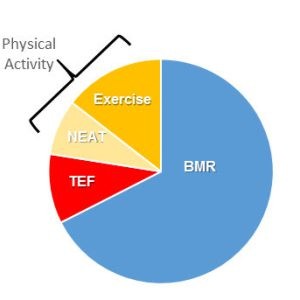Eat a Big Breakfast for Greater Diet-Induced Thermogenesis
Weight loss is an interesting topic these days. For some, bringing up the topics of keto, intermittent fasting, plant-based or some other popular nutritional topic of the day leads to heated discussions.
Unfortunately, some conversations are prefaced with 'I believe...' and then whatever nutritional opinion follows. Emotions can become so strong with nutrition that facts and evidence get thrown out the window. And positions can be maintained as though defending a religious perspective.
When discussing weight loss there are two predominant positions popping up on social media. One supposes that creating a caloric deficit is all that matters. You can eat fast food every day as long as you are eating fewer calories than you burn in a day. This ignores what the other position claims is vital, which is the quality of the nutrition.
Maybe you've heard the expression 'as long as it fits your macros' to justify eating certain foods. By macros we're referring to the macronutrients i.e. proteins, carbs and fats.
The truth is that both sides are correct. It matters how much you eat. A caloric deficit is needed to achieve weight loss. And the quality of the matters as well. You cannot achieve healthy weight loss with low quality nutrition..
But there's one more piece to the puzzle that typically tends to get ignored. And that's the timing of our nutrition.
In other words, would you expect eating the same foods in the same amounts at different times to have an impact on our weight loss efforts?
For example, if you ate a 2070 calorie breakfast, a 600 calorie lunch and a 330 calorie dinner...
Would this have any difference on our fat loss efforts than if we ate the following:
330 calorie breakfast, 600 calorie lunch, 2070 calorie dinner.
The answer is that it does make a difference.
A recent study looked at whether there was a difference in thermogenesis based on whether a larger breakfast or large dinner was eaten.
16 normal weight men ate either a large breakfast equivalent to 69% of daily calories or a small dinner of 11% of daily calories. In the example above I used 3000 calories to represent total daily intake, 11% equaled 330 calories and 69% equaled 2070 calories. The participants of the study ate the big breakfast or big dinner for three days. They then followed the opposite protocol of what they did for the first three days i.e. if they ate a big breakfast in the first part they ate a big dinner in the second part.
So what did they find?
Diet-induced thermogenesis was 2.5 higher following the big breakfast compared to the big dinner.
Does this really matter?
It can definitely make a difference. When we are seeking a weight loss goal we want to know how many calories we expend in a day. The total is a combination of our basal metabolic rate (70%), our non-exercise activity thermogenesis (15%), our exercise (5%) and the foods we eat (10%). The percentages listed are averages and will vary based on age, sex, level of obesity, which foods we eat and more.
The foods we eat can be responsible for 10% of the total energy we burn in a day. If someone is burning 2500 calories per day than the food we eat, digest and metabolize could be responsible for 250 of these calories. This study found that those that ate a bigger breakfast had 2.5 times the diet-induced thermogenesis. In other words, if breakfast normally accounted for 100 calorie burned this could be pushed up to 250 calories. For someone looking to create a 300-400 calorie deficit per day this is huge.
It get better.
When subjects ate a bigger breakfast compared to a small, hypo-caloric meal they were less hungry during the day and had less cravings for sweets. This is very important when seeking a weight loss goal as there will be less temptation to grab a treat or eat more than is needed for health.
One way we've thought about this in the past was to eat like a king, then a prince then a pauper in terms of calories. So early in the day eat the bulk of your calories and gradually reduce these as the day progresses. And for the best results make sure to eat the best quality foods you can at each meal.
Reference
Richter J. et al. 2020. Twice as High Diet-Induced Thermogenesis After Breakfast vs Dinner on High-Calorie as Well as Low-Calories Meals. The Journal of Clinical Endocrinology & Metabolism. 105(3).
When you subscribe to the blog, we will send you an e-mail when there are new updates on the site so you wouldn't miss them.

Comments